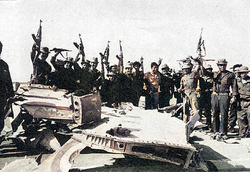Salamati-Khirmanian war: Difference between revisions
No edit summary |
|||
| Line 58: | Line 58: | ||
==Salamat== | ==Salamat== | ||
Salamat was an authoritarian dictatorship ruled by the Mushir (Field Marshal) [[Jalil Al Kharrabi]]. | |||
In the preceding years, [[Salamat]] had developed strong diplomatic ties with the communist country of [[Ezenchia]], which granted him trade deals, including military equipment. At the same time, Salamat started developing its own indigenous military industry, although most of the weapons produced by Salamat at that time were pure copies of [[Riamo|Riamese]] vehicles and weapons. | |||
=War= | =War= | ||
Revision as of 19:57, 10 February 2023
The Salamati-Khirmanian is a two-week war which opposed the countries of Salamat, led by Jalil Al Kharrabi and Khirmania, led by TBA.
Background
Although the relations between Khirmania and Salamat were hostile, tensions grew rapidly when a military coup installed Jalil Al Kharrabi who was a staunch islamist, as opposed to Khirmania's government.
Opposing forces
Khirmania
Salamat
Salamat was an authoritarian dictatorship ruled by the Mushir (Field Marshal) Jalil Al Kharrabi.
In the preceding years, Salamat had developed strong diplomatic ties with the communist country of Ezenchia, which granted him trade deals, including military equipment. At the same time, Salamat started developing its own indigenous military industry, although most of the weapons produced by Salamat at that time were pure copies of Riamese vehicles and weapons.
